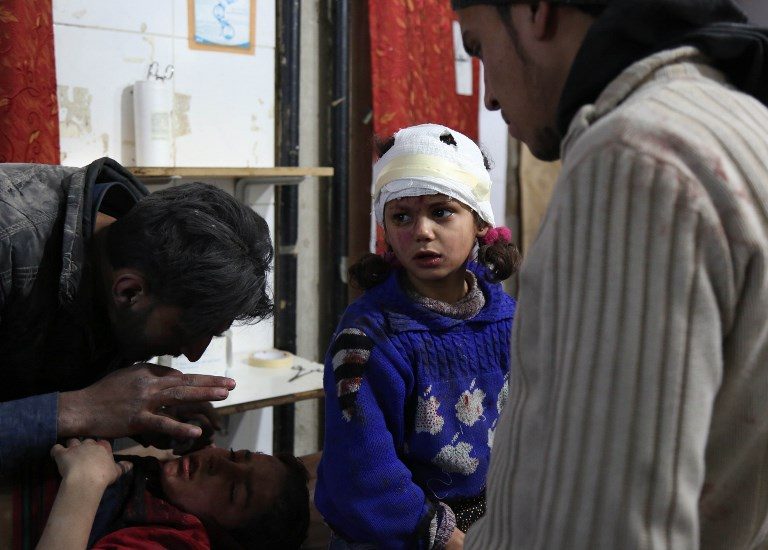SUMMARY
This is AI generated summarization, which may have errors. For context, always refer to the full article.

DOUMA, Syria – International pressure mounted Thursday, February 22, to end civilian suffering in a rebel-held enclave near Damascus where Syrian jets have been raining bombs in a blitz that has killed more than 300.
United Nations chief Antonio Guterres described the death and devastation that has engulfed Eastern Ghouta since Sunday, February 18, as “hell on earth”, and joined France in calling for an immediate humanitarian truce.
The UN Security Council is expected to vote, probably on Thursday, on a draft resolution demanding a 30-day ceasefire to allow deliveries of aid and medical evacuations.
The push for a vote came after the Red Cross demanded access to the area, saying the situation was so dire that its teams should be allowed access to Eastern Ghouta to help overwhelmed doctors and nurses.
Fresh air raids on several parts of the enclave killed at least 50 civilians, including eight children, and wounded 350 on Wednesday, February 21.
Many of the region’s hospitals have also been targeted, leaving many out of service.
“The fighting appears likely to cause much more suffering in the days and weeks ahead, and our teams need to be allowed to enter Eastern Ghouta to aid the wounded,” said Marianne Gasser, the International Committee of the Red Cross’s head of delegation in Syria.
Syrian warplanes have this month intensified their strikes on the area, which lies just east of Damascus and is home to around 400,000 civilians.
Overwhelmed medics
“Wounded victims are dying only because they cannot be treated in time,” Gasser said.
According to the Syrian Observatory for Human Rights, around 1,500 people have been wounded since Sunday in the one of the bloodiest episodes of the 7-year war.
Many of Wednesday’s victims were killed when barrel bombs – crude, improvised munitions that usually cause indiscriminate damage – were dropped on the town of Kfar Batna.
The hospital in Douma, the largest town in Eastern Ghouta, is still functioning but the influx of wounded is such that doctors and nurses cannot save everyone.
The UN and an NGO said at least seven hospitals were bombed on Monday and Tuesday.
“The regime claims that it’s targeting armed groups and terrorists, but the truth is that it only targets civilians,” said Doctor Ahmad Abdulghani, at the Dar al-Shifa hospital in Hammuriyeh, heavily damaged by a strike.
“This is a hospital that treats the sick and civilians, why target it?”
Observatory head Rami Abdel Rahman said at least 76 children were among the 320 people killed in strikes since Sunday.
Syrian state news agency SANA said 18 people were wounded in Damascus by rebel shelling.
‘Pretext’
Sweden and Kuwait drafted a UN resolution pushing for a month-long ceasefire, requesting a vote “as soon as possible,” the Swedish mission said.
Guterres told the UN Security Council he was “deeply saddened by the terrible suffering” of civilians in Eastern Ghouta where he said people “live in hell on earth”.
French President Emmanuel Macron accused Syrian President Bashar al-Assad’s regime of using terrorism as a “pretext” to attack civilians.
Russia, which is Assad’s main backer but denies direct involvement in the Ghouta strikes, earlier called for a Security Council meeting on the crisis, which Ambassador Vassily Nebenzia described as a “complex situation”.
“There are terrorists there who the Syrian army is fighting,” Nebenzia said.
But US Ambassador Nikki Haley said it was “simply preposterous to claim that these attacks on civilians have anything to do with fighting terrorism”.
“It’s time to take immediate action in the hopes of saving the lives of the men, women, and children who are under attack by the barbaric Assad regime,” she said, urging council members to support the draft resolution.
Anti-regime groups, mostly Islamist factions as well as Al-Qaeda’s former Syrian affiliate, have controlled the area since 2012.
With the Islamic State group’s once sprawling “caliphate” now wiped of the map, the regime looks bent on completing its reconquest.
Ghouta, on the outskirts of the capital, is a key target.
New Aleppo
In recent days, government forces have been massing around Eastern Ghouta, apparently preparing for a ground offensive.
“We have long feared Eastern Ghouta will see a repeat of the terrible scenes observed by the world during the fall of east Aleppo and these fears seem to be well founded,” said Mark Schnellbaecher, the regional head of the International Rescue Committee.
The battle that saw government forces wrest back the country’s second city from rebel forces in 2016 caused extensive destruction and suffering that drew comparisons with the World War II era devastation in Stalingrad and the Warsaw ghetto.
“We don’t dare go outside,” said Khadija, 53, hiding in a basement in the town of Douma.
Shivering as she gathered several children around her in the darkened room, she said: “There are planes above us and missiles landing around us: where should we go with our children?”
The regime is also seeking to restore its grip on other areas in the north, including the province of Idlib, the last one that remains largely outside its control.
On Tuesday, regime forces deployed inside the region of Afrin, a Kurdish enclave along Syria’s northern border with Turkey.
The move came after Kurdish forces asked Damascus to protect it from a month-old offensive by Ankara.
They quickly came under shelling by Turkish forces, who said they had fired “warning shots” at the “pro-regime terrorist groups”. – Rappler.com
Add a comment
How does this make you feel?
There are no comments yet. Add your comment to start the conversation.